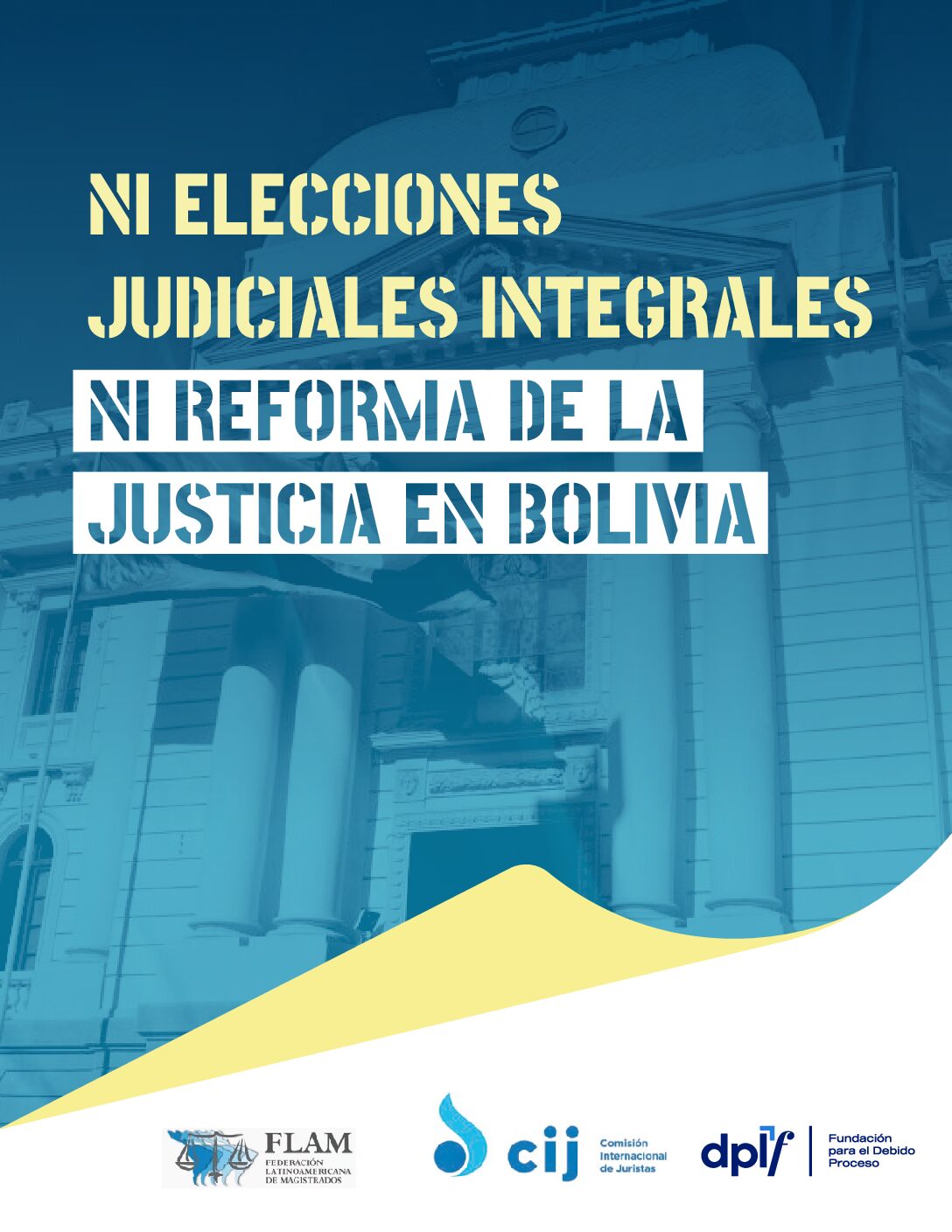Judicial election processes and reform efforts deeply flawed
The ICJ, jointly with the Due Process Law Foundation and the Latin American Federation of Magistrates, today launched the report titled “Neither comprehensive judicial elections nor judicial reform in Bolivia“, assessing the shortcomings of the recent pre-selection procedure for the election of higher judicial authorities and other challenges to the independence of the judiciary.
The report comes on the eve of partial judicial elections to be held on 15 December and provides recommendations aimed at strengthening judicial independence in the country, including a constitutional reform adopting a new selection procedure for higher judges that is carried out by an expert and independent body.
“As our report demonstrates, the present system does not contain the requirements for a competent, independent and impartial judiciary under the rule of law and is in urgent need of reform in order to guarantee the procedure meets international standards for independence of the judiciary”, said Carolina Villadiego Burbano, ICJ Latin America Team Leader.
The mandate of the judges elected in 2017 ended on 2 January, but the judges remain in their post despite that fact their constitutional mandate have already expired.
So far, Bolivia has held two complete judicial elections in 2011 and 2017 that evidence the interference with and politicization of the pre-selection procedure and the largest portion of votes cast by citizens consisting of blank and null ballots. During 2024, a new pre-selection procedure took place between February and August and the Assembly provided a list of candidates; a majority of them will be put to a popular vote on 15 December, as the election was suspended in five departments for the Constitutional Tribunal and two for the Supreme Court.
The report documents the many challenges and deficiencies in the process. The ICJ and partners provided recommendations to the authorities to strengthen judicial independence in the country and depoliticize the selection procedure of higher courts. In particular, the report recommends adoption of a constitutional amendment to modify the procedure so that it is be carried out by an independent expert body. It also recommends adoption of a permanent law aimed at regulating the actual preselection procedure to avoid ad hoc regulations for each process while a constitutional amendment is enacted, as well as to incorporate full transparency mechanisms and specific measures to encourage women and indigenous persons to apply to these processes. The organizations call on the Constitutional Tribunal to review its decision regarding the self-extension of their own mandates to bring it to terms with international law and standards.
Background
This report highlights the many deficiencies and challenges. First, the governmental authorities made numerous improper statements questioning the capability of some legislators to carry out the process, disregarding the role given to them Constitutionally. This led to a polarized political environment around the procedure.
Second, the Assembly failed to conduct the process with full transparency, there was a lack of uniformity between the two mixed-legislative chambers that conducted the procedures and a failure to publicize the scores of qualified applicants after the merit evaluation process was over.
Third, there was a failure to ensure the equal participation of women and the representation of indigenous persons.
Fourth, a large number of writs against the preselection procedure were filed, which caused delays and even its paralysis at various times. On certain occasions, judges suspended the entire procedure over amparo actions. On 4 November, after the pre-selection process was finalized and one month before the election, the Constitutional Tribunal ordered the suspension of the election process in five of the nine departments regarding the election of the Constitutional Tribunal, as well as in two departments for the election of the Supreme Court of Justice. The suspension affected the right to equality before the law and non-discrimination of the candidates that were pre-selected as they had a legitimate expectation of participating in the election on 15 December.
In addition, the higher judicial authorities elected in 2017 finalized their constitutional mandate on 2 January 2024. However, on 11 December 2023 the Constitutional Tribunal unilaterally extended the mandates of those authorities, including their own, until the completion of a new preselection and election process. Also, at the end of November 2024 the Tribunal decided that where the elections were not going to be held, the authorities with the extended mandates would remain in office. This decision is highly problematic. The right to have an independent and impartial judge, enshrined in both the International Covenant on Civil and Political Rights and the American Convention on Human Rights, includes guarantees related to judges´ security of tenure “until a mandatory retirement age or the expiry of their term of office”. Also, members of the Chamber of the Tribunal that made this decision will benefit directly from it as they will potentially will remain in office. Therefore, the decision lacks impartiality and possess a clear conflict of interest.
Full Report in Spanish
Report Presentation
Media Coverage





